|
|
|
Sort Order |
|
|
|
Items / Page
|
|
|
|
|
|
|
| Srl | Item |
| 1 |
ID:
161633
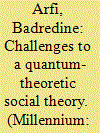

|
|
|
|
|
| Summary/Abstract |
A key claim that Alexander Wendt makes in his book Quantum Mind and Social Science: Unifying Physical and Social Ontology is that he is not using the ‘quantum’ as a metaphor. Nor is he drawing analogies either. He argues that he is constructing a quantum theory of the human subject and social structures through a quantum-theoretic explanation of consciousness undergirded by a panpsychist hypothesis of primitive proto-consciousness. In this article I show how Wendt’s insistence that he is developing a literally-speaking quantum-theoretic approach presents him with a number of must-not-ignore challenges that originate in quantum theory. I specifically discuss three challenges:
|
|
|
|
|
|
|
|
|
|
|
|
|
|
|
|
| 2 |
ID:
161630
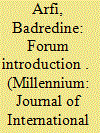

|
|
|
|
|
| Summary/Abstract |
Alexander Wendt’s Quantum Mind and Social Science: Unifying Physical and Social Ontology proposes a re-reading of many subjects and topics that have concerned IR theory over the last two decades through the quantum world and word. This book is situated quite uneasily in IR Theory: it touches upon many themes of IR theory while it understands itself to be situated beyond IR’s confines. Alexander Wendt readily admits that this book is more a treatise in social theory than ‘IR’ and he suggests that a third book will deal with ‘IR proper’.1 One could even say that this new book by Wendt is not even about a social theory of international politics as defined in his 1999 first – then groundbreaking – book. This book is about the philosophy of science and beyond … much beyond, even if the book does not always announce it as such.
|
|
|
|
|
|
|
|
|
|
|
|
|
|
|
|
| 3 |
ID:
161631
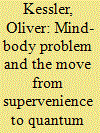

|
|
|
|
|
| Summary/Abstract |
At a time when most articles in International Relations (IR) go ‘micro’ and praise the promises of some new empiricism,1 Alexander Wendt shows with his Quantum Mind and Social Science: Unifying Physical and Social Ontology (hereafter Quantum Mind and Social Science) that Theory with a capital T is not dead at all. 2 This is a book that one not only reads, but one can actually study with much to think about. Wendt guides us through a world that is certainly fascinating, full of paradoxes, and mind-boggling insights.3 It is somewhat of a shame that for far too long, modern physics has not been part of our deliberations. At the same time, I think it is pretty fair to say that Wendt is not interested in fulfilling any pre-established expectations about what the ‘author’ Wendt stood for in IR so far.
|
|
|
|
|
|
|
|
|
|
|
|
|
|
|
|
| 4 |
ID:
161634
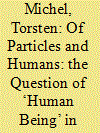

|
|
|
|
|
| Summary/Abstract |
Drawing on quantum theory, Alexander Wendt’s Quantum Mind and Social Science suggests a thought-provoking reorientation of the social sciences. Addressing some of the key assumptions in Wendt’s account, this article argues that despite a quite elaborate and eloquent development of a monist ontological position, conceptual discussions remain solely focused on the nature of beings and neglect wider implications for the nature of being, particularly human being, that arise out of its abandonment of a substance ontology.
|
|
|
|
|
|
|
|
|
|
|
|
|
|
|
|
| 5 |
ID:
161628


|
|
|
|
|
| Summary/Abstract |
As the planet warms, new authoritarian movements in the West are embracing a toxic combination of climate denial, racism and misogyny. Rather than consider these resentments separately, this article interrogates their relationship through the concept of petro-masculinity, which appreciates the historic role of fossil fuel systems in buttressing white patriarchal rule. Petro-masculinity is helpful to understanding how the anxieties aroused by the Anthropocene can augment desires for authoritarianism. The concept of petro-masculinity suggests that fossil fuels mean more than profit; fossil fuels also contribute to making identities, which poses risks for post-carbon energy politics. Moreover, through a psycho-political reading of authoritarianism, I show how fossil fuel use can function as a violent compensatory practice in reaction to gender and climate trouble.
|
|
|
|
|
|
|
|
|
|
|
|
|
|
|
|
| 6 |
ID:
161627


|
|
|
|
|
| Summary/Abstract |
Pirates are often described as existing on the margins of the world economy, emerging from the outskirts to disrupt otherwise free capitalist markets. With this narrative in mind, it is not surprising that the pirate remains a marginal figure within both the fictional stories and historical accounts of the emergence of capitalism. This article, however, asks: What do we learn about the capitalist world economy if we understand the pirate not as an outlaw but as a fellow capitalist? Weaving together stories of the golden age of piracy in the Atlantic world with contemporary piracy in the Gulf of Aden, I argue that pirate capitalism helps us to understand the capitalist world economy, not only demonstrating the violence and dispossession at the centre of capitalist accumulation but also making visible the fluid relationship between capital, sovereignty, violence, and freedom.
|
|
|
|
|
|
|
|
|
|
|
|
|
|
|
|
| 7 |
ID:
161635
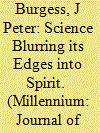

|
|
|
|
|
| Summary/Abstract |
Alexander Wendt’s 2015 Quantum Mind and Social Science is nothing if not true to its aims. Through rigorous argumentation and solid erudition it draws the logical lines from the state-of-the art of quantum theory to social reality. The result is a set of conclusions about the nature of social life that appear both plausible and convincing. And yet the voyage comes at a high price. For in order to reach its goal, Wendt’s reasoning blithely navigates around most traces of meaningful human experience or social relation that do not already hold social scientific currency. It avoids at some pains the deeply spiritual connections that have been made tenable by growing literature connecting Eastern religious thought and theoretical physics. It ignores any and all indices that might point to an explanation of the remaining quantum riddles through a rebooting of our ontological assumptions about quantum theory. Caught in a narrow understanding about question of being as the question of ‘which being’, Quantum Mind and Social Science thus misses the chance for truly insightful discovery about the nature of social relations.
|
|
|
|
|
|
|
|
|
|
|
|
|
|
|
|
| 8 |
ID:
161632


|
|
|
|
|
| Summary/Abstract |
This article reads Alexander Wendt’s Quantum Mind and Social Science as a work of social theory. A crucial element of any social theory is its account of action or agency. I explore Wendt’s quantum theory of social action by analysing two issues. First, Wendt argues that the success of quantum decision theory implies that human behaviour is quantum and therefore is likely to have been produced by a quantum brain. I interrogate this assumption and argue that it rests on the claim that mathematical descriptions map human and social reality in a realistic way. Second, Wendt combines quantum measurement, quantum linguistics, and quantum decision theory into a contextual account of human agency. On this image, social action arises out of connections to interwoven phenomenological, social, and temporal contexts. I suggest that this account of agency is appealing in some ways, but that social theorists have been working on a similar image outside the physics constraint for some time. I conclude that while insights from quantum social science should be an essential component of any post-classical social theory, the task of theorising social agency should not take place exclusively under the constraints of quantum physics or other mathematical descriptions.
|
|
|
|
|
|
|
|
|
|
|
|
|
|
|
|
| 9 |
ID:
161629
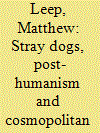

|
|
|
|
|
| Summary/Abstract |
International Relations scholars have recently begun exploring the politics of human-animal relations in global affairs. Building on Jacques Derrida’s work on hospitality and animals, this article theorises possibilities of responsibility to animals in war zones, pushing the limits of what it means to be with and for others regardless of their human or animal otherness. Specifically, I develop a critical account of cosmopolitan belongingness to illustrate how our being on earth is always a ‘being-with’ animal others. In thinking through possibilities of post-human belongingness that could emerge in times of war, cosmopolitanism becomes a futural task, an out-of-time and endless confrontation of past and future opportunities for interspecies togetherness. The theoretical significance of this approach is illustrated with a case study on the killing of stray dogs during the Iraq War. This case reveals a cosmopolitanism calibrated to more fully consider possibilities of human-animal belongingness amidst violence.
|
|
|
|
|
|
|
|
|
|
|
|
|
|
|
|
|
|
|
|
|